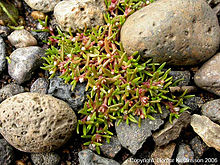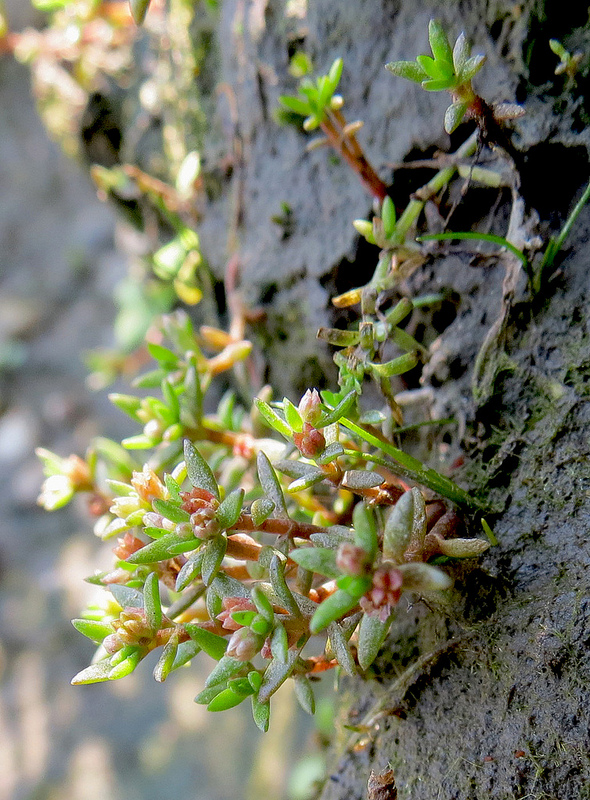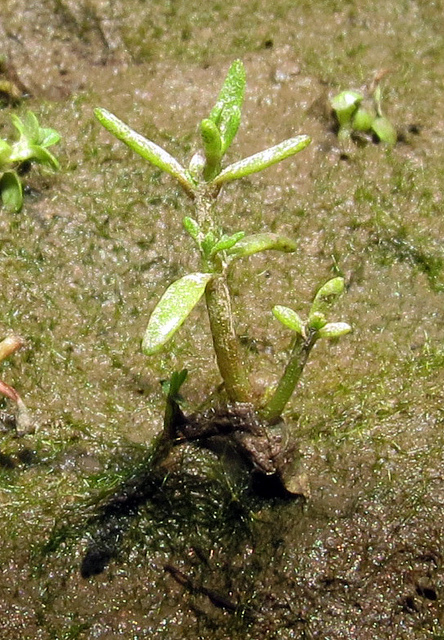Map Snapshot



6 Records
Seasonality Snapshot
Source: Wikipedia
This article needs additional citations for verification. (October 2024) |
| Water pygmyweed | |
|---|---|

| |

| |
| Crassula aquatica[1] | |
| Scientific classification | |
| Kingdom: | Plantae |
| Clade: | Tracheophytes |
| Clade: | Angiosperms |
| Clade: | Eudicots |
| Order: | Saxifragales |
| Family: | Crassulaceae |
| Genus: | Crassula |
| Species: | C. aquatica
|
| Binomial name | |
| Crassula aquatica | |
| Synonyms[citation needed] | |
|
Bulliarda aquatica | |
Crassula aquatica is a succulent plant known by the common names water pygmyweed,[2] common pygmyweed[citation needed] and just pigmyweed.[3] It is an annual plant of salt marshes, vernal pools, wetlands, and other fresh to brackish water bodies. It is at least partially aquatic, living in areas which are submersed much of the time. It also lives along muddy banks and in tidally-active areas of estuaries.
Description
[edit]Crassula aquatica is a small plant forming thin mats or small patches on mud and sand, and growing more erect when exposed to open air for longer periods. The flesh of the plant is greenish-yellow to bright red or purplish. The tiny fleshy pointed leaves are only a few millimeters long.[citation needed]
A flower grows on a short stalk from the intersection of each oppositely-arranged pair of leaves. The flower is only about two millimeters long and wide. The fruit is a minute follicle containing several seeds.[citation needed]
Distribution and habitat
[edit]This plant is widespread across North America and Eurasia.[citation needed] It is an annual plant of salt marshes, vernal pools, wetlands, and other fresh to brackish water bodies. It is at least partially aquatic, living in areas which are submersed much of the time. It also lives along muddy banks and in tidally-active areas of estuaries.[citation needed]
Conservation
[edit]It is listed as a vulnerable species in Newfoundland and Labrador.[4] Cavan Allen rediscovered Crassula aquatica in Maryland in 2012 after it had been last seen in that state in 1950.[5]
References
[edit]- ^ NRCS. "Crassula aquatica". PLANTS Database. United States Department of Agriculture (USDA).
Britton, N.L., and A. Brown, 1913, An illustrated flora of the northern United States, Canada and the British Possessions. 3 vols.. Provided by Kentucky Native Plant Society, New York.
- ^ NRCS. "Crassula aquatica". PLANTS Database. United States Department of Agriculture (USDA).
- ^ BSBI List 2007 (xls). Botanical Society of Britain and Ireland. Archived from the original (xls) on 2015-06-26. Retrieved 2014-10-17.
- ^ "Nine Species Protected Under the Province's Endangered Species Act". Government of Newfoundland and Labrador. April 29, 2015.
- ^ https://nmnh.typepad.com/the_plant_press/2014/03/more-than-a-pygmy-discovery.html Allen Cavan and Wesley Knapp. 2014. More Than a ‘Pygmy’ Discovery. Plant Press Vol. 17 (Number 1)
External links
[edit]

